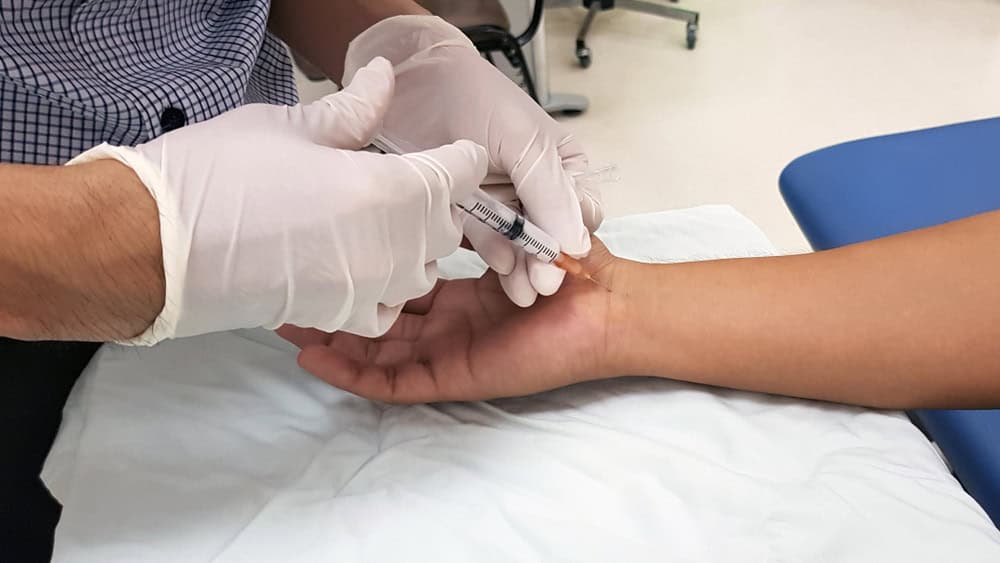Find relief with a neuropathy doctor in New Brighton, NY. Specializing in chronic nerve pain treatment, our team focuses on solutions to help restore mobility and comfort.. Whether dealing with peripheral neuropathy or nerve damage, our approach addresses your needs. Let us guide you to a pain-free future.

Reviews

At NY Spine Medicine, we specialize in neuropathy treatment to help patients in Staten Island manage nerve pain and regain daily function. Our team offers personalized care for those dealing with peripheral neuropathy, nerve damage, and chronic nerve pain. Using advanced diagnostic tools, we determine the root causes of nerve issues and create customized treatment plans to effectively address them.
We perform EMG and nerve conduction studies to detect nerve damage. Treatments vary on personalized needs and may include physical therapy, medication, or nerve stimulation to improve function and reduce discomfort. If you’re seeking a neuropathy doctor in NY, we’re ready to provide the assistance you need.


Ready to get started?
Living with nerve pain can make everyday tasks difficult, but neuropathy treatment can help. At NY Spine Medicine, our peripheral neuropathy doctor specializes in nerve damage treatment and chronic nerve pain treatment. Our team of neuropathy specialists use advanced diagnostic tools to understand the cause of your symptoms and develop treatments that improve nerve function.
If you’re searching for a neuropathy doctor in New Brighton, NY who provides care for peripheral neuropathy and long-term nerve damage treatment, we can help Contact our Staten Island office today and take the first step toward managing your pain and improving your quality of life.

Originally, Staten Island was inhabited by the Munsee-speaking Lenape Native Americans. The Lenape relocated during different seasons, moving toward the shore to fish during the summers, and moving inland to hunt and grow crops during the fall and winter. The present-day area of New York City was inhabited in 1624 by Dutch settlers as part of New Netherland. In 1664, the Dutch gave New Netherland to the British, and six years later the British finalized a purchase agreement with the Lenape.
At the time of British handover, several British, Dutch, and French settlers occupied the area, but did not have an established title to the land. A series of surveys were conducted through 1677, and several parcels were distributed to different landowners. Among them were the 340-acre (140 ha) “Duxbury Glebe”, given to Ellis Duxbury in 1708, bequeathed to the Protestant Episcopal Church of St. Andrew’s ten years later, and then leased for 54 years by John Bard in 1765. Another tract was granted to Lambert Jansen Dorlant in 1680, whose western boundary was a brook on present-day Jersey Street. By 1748 it had been purchased by Salmon Comes, who ran a ferry to Manhattan. By 1765, part of the Dorlant tract was owned by John Wandel, a molasses distiller who operated a plant at the Kill Van Kull near Richmond Terrace and Westervelt Avenue, taking advantage of the Jersey Street brook. Two Native American roads intersected near the distiller: Shore Road (today’s Richmond Terrace) on the North Shore, and a road that winded southward on St. Marks Place and then Hamilton and Westervelt Avenues.
Fort Hill, one of the hills overlooking the harbor, was the location on Duxbury’s Point or Ducksberry Point, fortified by the British during the American Revolutionary War. Hessian troops, contracted by the British, were stationed near the Jersey Street brook, which then became known as Hessian Springs. After the end of the war, the area remained primarily rural through the early 19th century. The area became part of the town of Castleton upon the town’s incorporation in 1788.
Learn more about New Brighton.Local Resources